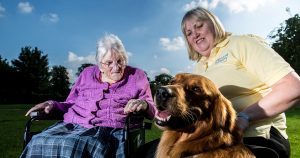Dementia Assistance Dogs – Can Dogs Help People With Dementia?
Assistance dogs carry out a wide range of help to people with disabilities and illnesses from, seeing eye dogs, to aiding people who suffer from post traumatic stress – In this article, Holidays4Dogs focuses on how dogs can help people with dementia – a valuable service which is relatively new to the UK.
How do dogs help people with dementia?
Dogs living in the homes of people  suffering with dementia can help to maintain routines, encourage activity and assist people to engage with their families and communities.
suffering with dementia can help to maintain routines, encourage activity and assist people to engage with their families and communities.
As well as this, dogs can provide constant companionship and provide familiar reassurance for sufferers when they face new situations.
Research has shown that having a dog can help to reduce feelings of anxiety and agitation amongst those suffering from dementia, or Alzheimer’s.
Routine and companionship.
Routine is one of the things that can become difficult for those in the early to mid stages of dementia, so one of the key elements of a trained assistance dog is to provide reminders by responding to timed alarms. This may include retrieving medication, for example.
Social interaction.
Research has shown that dogs can act as a catalyst for social interaction and this is especially helpful for those suffering from dementia. People with dementia may be less confident at talking to other people. This might be because of their lack of memory. A dog provides a focus point which helps people maintain existing friendships, as well as helping to make new ones.
Reduced stress and increased feelings of safety.
Dogs can have a positive effect on reducing feelings of anxiety for people with dementia. In addition, having a dog as a companion, can help people feel safer in their own homes, as well as when they are out and about. Fully qualified assistance dogs are permitted in shops, hospitals and on public transport.
Dementia Dogs Project UK.
A pilot project set up a few years ago by Dementia Dogs UK, has helped to clarify that dogs can bring a wide range of benefits to adults living with dementia.
Dementia Dogs started out as collaboration between Alzheimer Scotland, The Glasgow School of Art and Design, Dogs for the Disabled and Guide Dogs UK. Alzheimer Scotland commissioned the Glasgow School of Art with a service design project. Very soon, this caught the attention of the Scottish Executive and Design Council. As a result, funding was supplied to promote the realization of service dogs for people suffering with dementia.
Following a research programme, and after further successful funding applications, Dementia Dog began their first pilot scheme based at the Guide Dogs training centre in Forfar, Scotland.
Three, out of four dogs originally selected for training, were successfully placed with families. These dogs were fully trained and qualified dementia assistance dogs. The project continues to track the progress of these three dogs.
Dogs make the power of difference.
Animal assisted intervention has been an under utilised practice in the UK. However, organisations like Dementia Dog are learning more and more about how dogs  can make the power of difference to people living with disabilities.
can make the power of difference to people living with disabilities.
In 2016, further substantial funding was secured from the Life Changes Trust. This meant that Dementia Dogs could expand their training programme with a further eight dogs.
The people who work on the Dementia Dog project are passionate about their work and are able to see first hand just what a positive effect the dogs have on people with dementia.
Today Dementia Dogs are well established and can supply fully trained assistance dogs to people with dementia. Crucially, the dogs have full public rights access.
Alternatively, they can help people who would like to get their own pet dog. They can advice on choosing the right dog for you, as well as organising on-line training and advise workshops. You can find out more here.
Service assistance dogs can provide support for everyday living including building confidence and providing an important bridge for social interaction. This is crucially important with people suffering from dementia.
Other support organisations include, Dogs For Good – who provide community service dogs, dog day events and virtual therapy dog sessions.
Conclusion.
We already know, the bond people have with dogs is quite something. However, dogs living with people suffering from dementia, have an amazing ability to connect even deeper with their companions.


